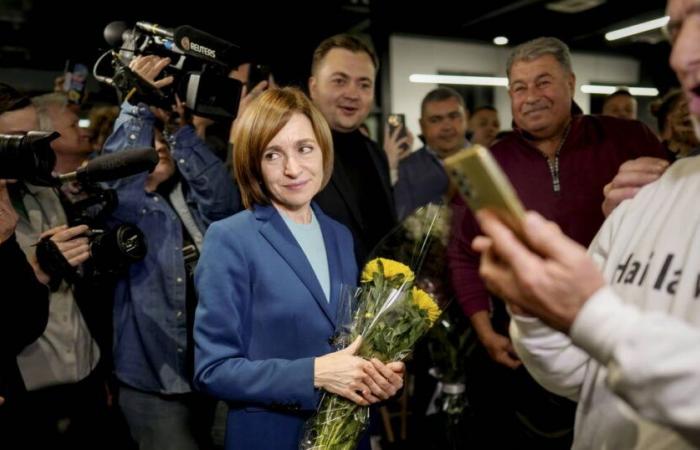Despite massive Russian destabilization efforts, the pro-European outgoing party won, notably thanks to the diaspora vote. She welcomed “a lesson in democracy”.
The Kremlin networks threw all their might into the battle, but it was not enough. After a tense inter-round campaign and a voting day marked by attempts at destabilization, Moldova re-elected Maia Sandu, the pro-European president, on Sunday, November 3, for a second four-year term. After counting almost all the ballots, she won with 55.36% of the votes, against 44.64% for Alexandr Stoianoglo, her socialist rival.
This former attorney general, dismissed by the pro-European government, played his cards carefully by avoiding being too caricatured as pro-Russian. But it is undeniable that Moscow's networks had made him the candidate to support, through massive interference efforts. During the months of September and October, the network of oligarch Ilan Shor, the Kremlin's liege man, spent 36 million euros to pay its “activists” and above all to buy votes. This amount, revealed by the Moldovan police, only concerns money directly transferred to activists through a Russian bank under sanction. It is almost certain that other, equally large sums were poured into the country. In comparison, Maia Sandu's Action and Solidarity party spent less than 700,000 euros on its campaign.
Planes full of voters
As the vote approached, tension rose in the country. On the radio, an official spot played over and over: “Buying a vote is illegal, if someone offers it to you, report them.” In the last forty-eight hours before the vote, public figures and anonymous Moldovans received threatening calls and messages from bots urging them to vote for Maia Sandu. According to disinformation researcher Victoria Olari, who relies on the vocabulary used, it was a false flag manipulation, probably orchestrated by Russia.
On Sunday, the first signals were worrying. Videos were circulating on social networks of planes full of Moldovans living in Russia taking off from Moscow or Saint Petersburg to vote in Minsk (in Belarus), Baku (in Azerbaijan) or Istanbul (in Turkey). There too, the operation was orchestrated. The flights were reportedly free (which is illegal) and aimed to circumvent the opening of only two diaspora polling stations in Russia. The crowds were also massive in the offices intended for residents of Transnistria, a separatist region controlled by avatars of the Kremlin. At 11 a.m. on Sunday, participation was already higher than in the first round. At the same time, false bomb threats multiplied in offices in Western Europe in an attempt to prevent the diaspora deemed to support the president from voting.
“Lesson of democracy”
So, when the first results, still partial, were published on Sunday evening at 10 p.m., a first wave of semi-relief swept over the pro-Europeans and the supporters of the outgoing president. Maia Sandu was certainly behind, but at 48% against 52 for Stoianoglo, the gap could still be reversed with the vote of the capital and the diaspora, always taking longer to be counted. As the results arrived and the map of the country turned blue, the color of the President, the gap narrowed and conviction grew. She was going to win.
With 55%, the victory is ultimately large. As is often the case in Moldova, it is due to the diaspora, who voted more than 82% for the outgoing party, and whose number of voters is higher than it has ever been. On Moldovan territory itself, Maia Sandu was defeated by Stoianoglo, who won almost 51% of the vote. Throughout the country, the mobilization was strong, commensurate with the stakes of these elections. When she spoke a little after 1 a.m., her voice broken by the campaign, Maia Sandu thanked “Moldovans from within and from the diaspora”. “Today you gave a lesson in democracy worthy of being in the history books. Together, we have shown the strength of our unity and our commitment to a dignified future.”
Heading towards the legislative elections
During the night, the first messages of congratulations poured in. “Democracy has triumphed over all interference and all maneuvers”greeted Emmanuel Macron. “It takes rare strength to overcome the challenges you faced in this election. I am happy to continue working with you to a European future for Moldova»also indicated the President of the European Commission, Ursula von der Leyen.
But the geopolitical storm that Moldova has been going through since 2022 is not over. The country is divided, cut in two, with the North and the South loyal to candidates close to Moscow and the center acquired by the pro-Europeans. In Gagauzia, an autonomous region with growing Russophile tendencies, Stoianoglo won with 97% of the vote. This is even more than in Transnistria where it gathered 79%.
The biggest challenge will come in the summer of 2025, during the legislative elections. Despite the focus on the character of Maia Sandu, at home and abroad, by pros and antis alike, Moldova is not a presidential regime. It is the legislative elections which will decide, once again, the geopolitical future of the country.






